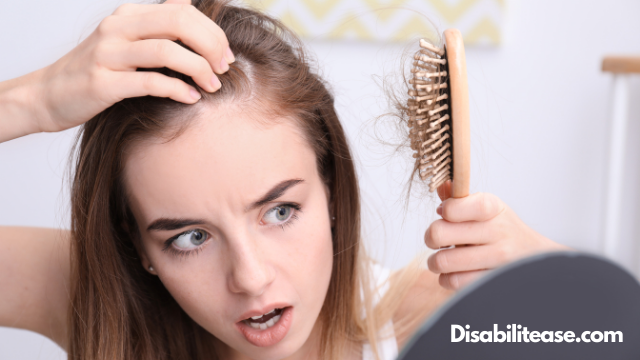What Arthritis Medications Cause Hair Loss? Let’s find out. Arthritis is the swelling of joints that comes along with pain, redness, limiting mobility, and interference with daily activities.
This is observed in the old age group and worsens with age. 1 in 5 persons in the U.S have arthritis, which affects 1 in 250 babies and children; it can occur in any ethnicity, gender, and age. Also, it can be treated but not cured.

Hair loss is a disadvantage of many drugs used to treat arthritis that many patients suffer. Some of such drugs are
- Rheumatrex,
- Methotrexate (Trexall)
- Leflunomide, (Arava)
- Etanercept (Enbrel)
- Adalimumab (Humira)
Here is a related article that might interest you on Best Arthritis Drugs With The Least Side Effects.
Table of Contents
Medication and Arthritis – What Arthritis Medications Cause Hair Loss?
Currently, there are above hundred kinds of arthritis that have been under research, but the following 5 are the most common types:
- Osteoarthritis.
- Rheumatoid Arthritis.
- Psoriatic Arthritis.
- Gout.
- Lupus.
While many medicines are available, arthritis usually doesn’t have a definite cure. The medications prescribed are usually for the management of signs and symptoms, such as inflammation Mostly drugs are given, and pain is treated by giving analgesics.
All medicines have advantages and disadvantages. The medications are prescribed when their benefits outweigh the side effects. One of the most feared side effects in the patients who have arthritis is hair loss, as hair is considered an essential part of one’s beauty and personality;
So hair loss can affect one’s mental health, especially when going through such a disease which is only going to get worse with age and can’t be cured but requires lifelong management and medications.
Can Arthritis Medications Cause Hair loss?

Hair loss is a disadvantage of many drugs used to treat arthritis that many patients suffer. Some of such drugs are
- Rheumatrex,
- Methotrexate (Trexall)
- Leflunomide, (Arava)
- Etanercept (Enbrel)
- Adalimumab (Humira)
Mainstay drugs for all types of arthritis are Disease-modifying antirheumatic agents (DMARDS). They are necessary to delay the disease’s progression and manage symptoms. DMARDS that cause hair loss are
- Methotrexate
- Leflunomide
The most basic drug used in treatment is DMARD, and among them, the most popular is Methotrexate.
Methotrexate:
It’s one of the most popular drugs proven to improve the symptoms of arthritis, specifically rheumatoid arthritis.
Methotrexate makes up 1-3% of hair loss Out of all the anti-rheumatic drugs. The hair loss is because the drug is doing its function by stopping the production of new cells.
The drug is not organ-specific but instead circulates through the blood and affects all organs. Hence, it also affects hair follicles, resulting in hair loss.
Due to its interference with cell replicating ability, it’s considered a chemotherapeutic agent.
Also, many people know that chemotherapeutic agents are used primarily for treating cancer, and the most talked-about side effect is hair loss. This should be kept in mind that based on dose, the mode of administration methotrexate given for cancer treatment is very different from Methotrexate given for arthritis, so it’s not going to cause some hair loss as in the case of cancer. This is also because the dose used for treating cancer is exceptionally high compared to arthritis.
Most people experience hair loss when they take Methotrexate orally, and it improves when taken in injectable form.
Many patients are bothered by the hair loss methotrexate brings and are reluctant to take the drug. A Polish study done in 2019 involving 68 people stated that around 30% of people experience hair loss in a brief period of using Methotrexate.
Some researchers also did control-controlled studies and concluded the hair loss effect is dose-related and less or no hair loss was experienced in low-dose methotrexate takers.
To minimize hair loss, Methotrexate is given along with Folic acid by physicians. The synthetic form of folate and vitamin B can help counter methotrexate side effects and protect your hair. Although, there is no evidence that it will promote growth.
Folic acid is commonly given by doctors with Methotrexate to eliminate and prevent its dermatologically related side effects. Taking this pharmacological form of folate, vitamin B complexes, can help keep your hair healthy, but it has not shown any evidence of promoting hair growth.
Leflunomide :
Also known as ARAVA, it’s another popular and commonly used DMARD. It’s prescribed with Methotrexate. It causes hair loss in similar ways to Methotrexate. Around 10% of users complain of hair loss.
Biological Agents:
In a few cases, doctors prescribe biological agents such as
- Etanercept
- Adalimumab
These drugs bring in changes in levels of cytokines (messenger entities) in the body; however, the mechanism through which they cause hair loss is still under research.

Etanercept comes with Enbrel and adalimumab under Humira, especially in inflammatory arthritis. Although hair loss is reported, it’s very insignificant compared to the above-stated drugs mainly because it targets immune system proteins, and their effect is not that extensive and long-lasting. They are targeted drugs and produce targeted action.
Therefore, they don’t produce any significant effect on hair follicles, and whatever effect is produced is due to changes in the cytokine level.
NSAIDs
NSAIDs or non-steroidal anti-inflammatory drugs are very important in any arthritis because underlying inflammation is the primary pathology of arthritis.
One of the most commonly used NSAIDs is ibuprofen, also sold as Motrin produces a telogen effluvium effect, and secondary to this is hair loss.
Such hair losses are stress-precipitated, and stress can be a drug. When taken in a significant amount and times a day, NSAIDs most likely halt the cell replication process prematurely in the resting phase or telogen phase.
This change doesn’t occur overnight, and hair loss is not evident until two or more months after the beginning of the intake of medicines.
Steroids:

Steroids are usually given in extreme conditions or for the treatment of nodules. They are injected directly into nodules. They can also cause hair loss. Steroids cause increased androgen levels in the body by raising DHT levels in the body.
Not all steroids cause hair loss, but some, such as methylprednisolone, can cause thinning of the scalp. Also, anabolic steroids can contribute to hair loss by messing with several body systems.
Hereditary Pattern Baldness
Some individuals and especially males have genes of baldness running in families. This matter is sometimes made worse by using medicines due to arthritis. These medicines might or might not directly produce a hair loss effect but can activate and exacerbate baldness due to genes.
Takeaway:
The drugs used for arthritis are necessary and can’t be avoided in patients ultimately suffering from signs and symptoms. They need to be managed because they will worsen with age despite a well-structured treatment for every individual patient.
Another post that will interest you is about Can Arthritis Ever Be Cured? What Are The Treatment Options?
Hair loss is a documented side effect but still is not that significant in the population. The patient who suffers from this can manage hair loss by taking folic acid, B vitamins, and Vitamin E.
The dose or drug regimens can be adjusted as per your body’s needs and tolerance. If no positive change is observed, one can be referred to a dermatologist for hair regrowth procedures and topical medications. Along with this, also maintain that you are following up with a rheumatologist.
If still no improvement is observed, consider other causes of hair loss which can be many endocrine causes or simply anaemia.

Hi, my name is Eddie, I am a professional trainer specializing in the elderly population and I’m also a website designer. I love training in the gym, going to the beach, traveling, and having good food.
I combined my love for sport and website designing to make “DisabilitEase” whose purpose is to help elderly and disabled people live a more full and active life, have more fun, and enjoy their unique journey despite any disability.



